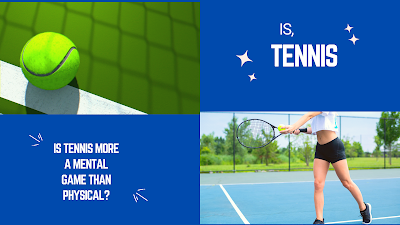Is Tennis More a Mental Game Than Physical?
Is Tennis More a Mental Game Than Physical?
Introduction
welcome let find this quary like Is: Tennis More a Mental Game Than Physical?
Tennis, is the sport of elegance and precision, where players dance across the court with grace and finesse, wielding rackets like extensions of their own arms. But behind the seemingly effortless volleys and powerful serves lies a deeper question: Is tennis more a mental game than physical one? Let's unravel this age-old debate and discover the intricate balance between mind and body in the world of tennis.
Table of Contents
- Introduction(Is Tennis More a Mental Game Than Physical?)
- 1. The Mental Arena of Tennis
- 1.1 The Battle Within
- 1.2 The Power of Focus
- 1.3 Emotional Rollercoaster
- 2. The Physical Demands
- 2.1 Strength and Stamina
- 2.2 Precision and Technique
- 2.3 Injury and Endurance
- 3. Striking a Balance
- 3.1 Mind-Body Connection
- 3.2 Training Strategies
- 3.3 Pre-Game Rituals
- ConclusionIs
- FAQs
1. The Mental Arena of Tennis
Ah, the battleground of the mind, where champions are forged and victories are won. In the realm of tennis, mental strength often separates the good from the great. Let's delve into the psychological aspects that shape the game. find this answer Is Tennis More a Mental Game Than Physical? {1}
1.1 The Battle Within
Picture this: You're standing at the baseline, sweat trickling down your forehead, heart racing with anticipation. The opponent stares you down from across the net, their eyes burning with determination. In that moment, it's not just about hitting the ball; it's a battle of wills. Every point becomes a test of mental resilience, as doubts creep in and nerves threaten to unravel your game.
1.2 The Power of Focus
In tennis, focus is paramount. It's about shutting out distractions—the crowd's whispers, the opponent's mind games—and zeroing in on the task at hand. A lapse in concentration can spell disaster, turning a surefire winner into an unforced error. Maintaining mental clarity amidst the chaos of a match separates champions from the rest.
1.3 Emotional Rollercoaster
Tennis is an emotional rollercoaster, with highs of euphoria and lows of frustration. Every missed shot, every disputed call, sends a ripple through your psyche. Managing emotions is key; channeling adrenaline into aggression, turning disappointment into determination. It's a delicate balance, walking the tightrope between passion and composure.
2. The Physical Demands
While the mind may rule the game, the body is its vessel. Tennis demands peak physical performance, pushing players to their limits and beyond. {2}
2.1 Strength and Stamina
Endurance is the name of the game in tennis. Matches can stretch on for hours, testing the limits of cardiovascular fitness and muscular endurance. The ability to maintain intensity from the first serve to the final point separates contenders from pretenders. Strength is also crucial, powering through shots with explosive force and resilience.
2.2 Precision and Technique
Tennis is a game of millimeters, where the slightest deviation can mean the difference between victory and defeat. Precision and technique are paramount, requiring hours of practice to master. From the angle of the racket to the placement of the feet, every movement must be executed with finesse and accuracy.
2.3 Injury and Endurance
The physical toll of tennis cannot be overstated. From overuse injuries like tennis elbow to acute strains and sprains, players must endure pain and discomfort in pursuit of greatness. But resilience is ingrained in the tennis psyche, pushing through adversity and bouncing back stronger than before.
3. Striking a Balance
So, is tennis more a mental game than physical one? The truth lies in the delicate dance between mind and body, where neither can thrive without the other. {3}
3.1 Mind-Body Connection
In tennis, the mind and body are intrinsically linked. A strong mental game enhances physical performance, while physical prowess bolsters mental resilience. It's a symbiotic relationship, each feeding off the other in a perpetual cycle of growth and improvement.
3.2 Training Strategies
To excel in tennis, one must train both the mind and body. Physical conditioning builds endurance and strength, while mental exercises sharpen focus and concentration. Visualization techniques, mindfulness practices, and meditation can all enhance mental fortitude, giving players the edge when it matters most.
3.3 Pre-Game Rituals
Before stepping onto the court, players often have rituals to prepare themselves mentally and physically. Whether it's a specific warm-up routine, a pep talk with a coach, or a moment of quiet reflection, these rituals help center the mind and channel focus toward the task at hand.
Conclusion (Is Tennis More a Mental Game Than Physical?)
In the end, the debate over whether tennis is more a mental game than a physical one is a futile one. Tennis is a holistic endeavor, where mind and body intertwine to create greatness. It's the mental fortitude to push through adversity, the physical prowess to execute with precision, and the symbiotic relationship between the two that defines the sport. So, the next time you step onto the court, remember: it's not just about hitting the ball—it's about mastering the art of balance between mind and body.
FAQs ( Is Tennis More a Mental Game Than Physical? )
1. Is tennis more about strategy or physical ability?
Answer: Tennis requires a combination of both strategy and physical ability. While strategy dictates shot selection and court positioning, physical ability determines the execution of those strategies.
2. How can I improve my mental game in tennis?
Answer: Improving your mental game in tennis involves practicing mindfulness, visualization, and focus techniques. Working with a sports psychologist or coach can also be beneficial.
3. What role does confidence play in tennis?
Answer: Confidence is crucial in tennis, as it directly impacts performance. Believing in your abilities and maintaining a positive mindset can give you an edge over your opponents.
4. How do top tennis players deal with pressure?
Answer: Top tennis players deal with pressure by staying focused on the present moment, trusting in their training, and maintaining a calm demeanor on the court. They also develop coping strategies to manage nerves and anxiety.
5. Can mental fatigue affect tennis performance?
Answer: Yes, mental fatigue can significantly affect tennis performance. It can lead to lapses in concentration, poor decision-making, and decreased physical stamina. Implementing rest and recovery strategies is essential to combat mental fatigue and optimize performance.


.png)
.png)
.png)



Post a Comment